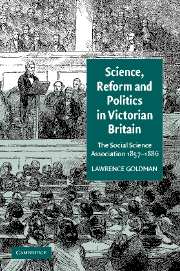Book contents
- Frontmatter
- Contents
- List of illustrations
- Acknowledgements
- Note on citations in the text
- List of abbreviations
- Introduction: the contexts of the Social Science Association
- Part I POLITICS
- Part II REFORM
- Part III SCIENCE
- Part IV DECLINE
- Chapter 12 The decline of the Social Science Association: Liberal division, specialisation, and the end of Equipoise
- Conclusion: The Social Science Association and social knowledge
- Appendix I The founders of the Social Science Association, 29 July 1857
- Appendix II Social Science Association Congresses, 1857–1884
- Appendix III Presidents of the Social Science Congresses, 1857–1884
- Appendix IV Departmental presidents, 1857–1884
- Select bibliography
- Index
Chapter 12 - The decline of the Social Science Association: Liberal division, specialisation, and the end of Equipoise
Published online by Cambridge University Press: 22 September 2009
- Frontmatter
- Contents
- List of illustrations
- Acknowledgements
- Note on citations in the text
- List of abbreviations
- Introduction: the contexts of the Social Science Association
- Part I POLITICS
- Part II REFORM
- Part III SCIENCE
- Part IV DECLINE
- Chapter 12 The decline of the Social Science Association: Liberal division, specialisation, and the end of Equipoise
- Conclusion: The Social Science Association and social knowledge
- Appendix I The founders of the Social Science Association, 29 July 1857
- Appendix II Social Science Association Congresses, 1857–1884
- Appendix III Presidents of the Social Science Congresses, 1857–1884
- Appendix IV Departmental presidents, 1857–1884
- Select bibliography
- Index
Summary
At the final congress of the Social Science Association in Birmingham in 1884 George Shaw-Lefevre noted a ‘distinct revival… of public interest in social questions. New questions, some of them touching the very foundations of society and property, are being raised and discussed by the people, and should be freely handled by such a society as this.’ Yet by 1886 the Association was dead. Why, on the threshold of an era notable for increased social awareness and the growth of a new ‘social politics’ did the SSA cease to meet? The answers go beyond merely institutional reasons, and must be approached through broad analysis of changes in late-Victorian culture and politics. The SSA was the product of a specific generation and socio-political context, and it declined as that context changed.
We can begin with the institution itself, nevertheless. When Shaw-Lefevre delivered his address it was to ‘an audience of nearly 100 persons’. Compare this to the several thousand who attended the plenary meetings of the Association when it was first in Birmingham in 1857 and the institutional problem is clear. At the Newcastle congress in 1870 ‘between 1,200 and 1,300 tickets’ were purchased, which, if not as many as in the early 1860s, was large enough to sustain the SSA's finances and the interest of its debates. Through the mid-1870s participation stayed at approximately this level.
- Type
- Chapter
- Information
- Science, Reform, and Politics in Victorian BritainThe Social Science Association 1857–1886, pp. 349 - 367Publisher: Cambridge University PressPrint publication year: 2002



